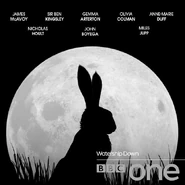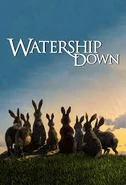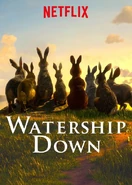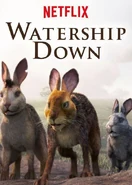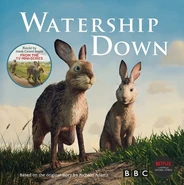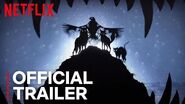Watership Down is an animated action adventure-drama fantasy thriller miniseries directed by Noam Murro. It is based on the 1972 novel of the same name by Richard Adams and adapted by Tom Bidwell. It was released on 22 December 2018 in the United Kingdom and internationally on Netflix the next day. The BBC broadcast comprised two back-to-back episodes per day.
It is the third visual adaptation of Watership Down, following the 1978 film and the 1999-2001 TV series.
This version of Watership Down is darker in tone compared to the TV series and is more in line with the original film. While it is suitable for teenagers and older, it is not suitable for young or sensitive children and was given a PG rating. Some blood and light violence is depicted.
Cast[]
- James McAvoy as Hazel
- Nicholas Hoult as Fiver
- John Boyega as Bigwig
- Ben Kingsley as General Woundwort
- Tom Wilkinson as Threarah
- Gemma Arterton as Clover
- Peter Capaldi as Kehaar
- Olivia Colman as Strawberry
- Mackenzie Crook as Hawkbit
- Anne-Marie Duff as Hyzenthlay
- Taron Egerton as El-Ahrairah
- Freddie Fox as Captain Holly
- James Faulkner as Frith
- Lee Ingleby as Campion
- Miles Jupp as Blackberry
- Daniel Kaluuya as Bluebell
- Rory Kinnear as Cowslip
- Craig Parkinson as Sergeant Sainfoin
- Rosamund Pike as the Black Rabbit of Inlé
- Daniel Rigby as Dandelion
- Jason Watkins as Captain Orchis
- Adewale Akinnuoye-Agbaje as Vervain
- Gemma Chan as Dewdrop
- Rosie Day as Thethuthinnang
- Henry Goodman as Blackavar
- Peter Guinness as Silverweed
- Charlotte Spencer as Nettle
- Isla Johnston as Lucy
Soundtrack[]
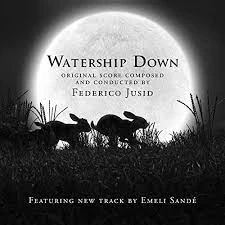
Main page: Miniseries/Soundtrack
Episodes[]
| No. | Title | Directed by | Written by | Original release date |
|---|---|---|---|---|
| 1 | "The Journey" | Noam Murro | Tom Bidwell | 22 December 2018 |
| Concerned by troubling visions his brother Fiver has about an encroaching threat, Hazel and several other rabbits set out in search of a new safe haven. | ||||
| 2 | "The Raid" | Noam Murro | Tom Bidwell | 22 December 2018 |
| Efforts to liberate female rabbits to join the new warren lead to trouble for its members. At Hazel's behest, Fiver endures another haunting vision. | ||||
| 3 | "The Escape" | Noam Murro | Tom Bidwell | 23 December 2018 |
| The rabbits plan a daring rescue from Efrafa that requires crafty infiltration by Bigwig. Questions arise about loyalty amongst the female captives. | ||||
| 4 | "The Siege" | Noam Murro | Tom Bidwell | 23 December 2018 |
| Hazel and the others finally find a place to settle. But General Woundwort and his Efrafa rabbit army launch a costly full-scale attack on the new warren. | ||||
Reception[]
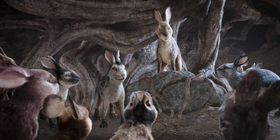
Hazel makes a speech
Watership Down received generally positive reviews, with praise for the narrative and performances of its voice cast, but receiving criticism for its tone and the quality of the computer animation, described as "soulless" and "clunky". On Rotten Tomatoes, the miniseries has an approval rating of 77% based on reviews from 22 critics, with its critical consensus reading "Though its animation leaves something to be desired, Watership Down is a faithful adaptation that will resonate with viewers of any age." On Metacritic, it has a weighted average score of 76 out of 100 based on 5 critics, indicating "generally favourable reviews".
The Guardian and The Independent both gave it two stars out of five, calling the production "tame, drab and deeply unsatisfying." and "spectacularly ho-hum – less tooth and claw than head shake."
The Times was more positive, giving it three stars out of five, writing "this was a meaty, lovingly made production that, spread over two days, felt far too long." While the New York Times noted that though the adaptation "fails its potential, it benefits from strong voice performances and a solid central story. Even this easy-listening version, which lays on the romance, jokes and limp dialogue, has moments of grandeur and the sweep of a fantasy epic."
The miniseries won a Daytime Emmy Award for Outstanding Special Class Animated Program.
Differences from the book[]
Story differences[]
- Pipkin, Silver, Buckthorn, Acorn, Speedwell, and Captain Mallow are entirely absent.
- This marks the first time Bluebell has appeared in a screen adaptation.
- Holly goes to Efrafa with Bluebell and Blackberry (instead of Silver, Buckthorn, and Strawberry) and goes on accord after being told about it by Kehaar rather than being sent there under Hazel's command and consent.
- Sandleford is destroyed with mechanical shovels instead of poison gas.
- Clover and Haystack are the only hutch rabbits to escape successfully. Also, Clover gets captured and taken to Efrafa in this version.
- After learning of Hazel's location after being shot, Clover looks for him instead of Fiver.
- Using a boat to escape the Efrafan forces is omitted, with the rabbits opting to hide inside a nearby human village.
- Hazel and Clover fall in love, while Holly and Hyzenthlay fall in love. In the original novel, these romances were the opposite (Hazel and Hyzenthlay, Holly and Clover)
- Bigwig falls in love with Strawberry (in this version a doe) instead of Thethuthinang.
- Captain Vervain is killed by the train instead of Captain Charlock, who isn't mentioned at all.
- Captain Orchis has a much more significant role, replacing Vervain as the secondary antagonist.
- The Efrafan Wide Patrol Bigwig accidentally leads a fox onto is being led by Captain Campion instead of Captain Mallow, who isn't mentioned at all. Bigwig doesn't attempt to warn them and instead runs right through them. Also, the fox kills three patrol members (not including Campion) instead of just one.
- Holly is killed during the final battle (this is the first adaptation where he dies).
- Captain Campion questions Woundwort's intentions before and during the siege of Watership Down. He betrays his chief at the end by refusing to go into the Watership Down warren with him and killing the enemy rabbits, declaring that he would rather be a good rabbit than a good soldier, something said to him by Holly. He then leaves with several other deserting Efrafans and is never seen again.
- Bigwig and General Woundwort meet just before Kehaar attacks the latter.
- General Woundwort is given a slightly different backstory. His entire family has been massacred by a fox that scarred and blinded his left eye (this is notably the only screen adaption that explains Woundwort's blind left eye, a description not given in the original book). The rest of his backstory and rise to power is not defined, though he reveals to Clover that he briefly lived in a hutch, implying the rest of his story went the way it did in the novel.
- Woundwort also becomes interested in Clover, partly because she used to be a hutch rabbit like he was. Being the only adaption showing interest in a doe, he offers to let her become his "queen," indicating he wishes to start a lineage with her. However, he later rejects her offer to be his queen if he stops Hyzenthlay's execution, saying he is not a rabbit who makes deals.
- Fiver and Blackavar go with Hazel to lure Bob to Watership Down instead of Dandelion and Blackberry. Despite being the fastest rabbit, Dandelion doesn't help with the raid due to injuries from the Battle of Watership Down.
- When Bigwig ambushes Woundwort, he bites and injures the General's hind leg instead of his foreleg.
- Instead of Hazel, Fiver is the rabbit that releases Bob before getting caught by Tab and rescued by Lucy.
Character differences[]
- Instead of Hazel, Fiver is the rabbit that releases Bob before getting caught by Tab and rescued by Lucy.
- Despite Dandelion retaining his status as the fastest runner, Bluebell is presented as the storyteller for the rabbits (this marks the first adaptation where Dandelion is not the storyteller).
- Along with being given Dandelion's storytelling abilities, Bluebell also displays a more innocent and timid side to his character, incorporating an absent Pipkin's personality.
- Strawberry, Laurel, and the Black Rabbit of Inlé are portrayed as does instead of bucks.
- Bob, the Nuthanger Farm guard dog, is a Rottweiler instead of a black Labrador.
- Tab the farm cat doesn't talk.
- Kehaar is a bit more selfish in this version, as he initially refuses to help the Watership Down rabbits and briefly leaves them after believing that his wing has healed. He also speaks in a Scottish accent rather than an Eastern European sailor.
- Bigwig is considerably more aggressive and confrontational, showing much less of a softer side than his previous incarnations.
- Hyzenthlay is far less trusting.
- General Woundwort is more secluded, as he mostly leaves the running of Efrafa to his officers. He is even more ruthless, as he plans to massacre every rabbit living on Watership Down, unlike in the novel where he intends to bring the deserters back to Efrafa. He also kills one of his soldiers just for questioning him, something he has never done before in previous adaptions. Woundwort also seems to lack the particular respect for Campion that he has in previous adaptations.
- Campion is shown to be more conflicted about his loyalty to Woundwort (much like in the TV series) and is uncomfortable with some of Efrafa's brutal policies, particularly the policy of "marking." However, as mentioned above, he ultimately betrays Woundwort out of disillusionment, unlike in the novel, where he abandons him out of fear when Bob attacks the Efrafans.
Behind the scenes[]
Media[]
Merchandise[]
Main page: Miniseries/Merchandise
Books[]
Main page: Miniseries/Books
Trivia[]
- Unlike the 1978 movie & TV Series, the miniseries does not include the song Bright Eyes.
- During a scene in the human village a memorial bench can be seen with Richard Adams' name on the plaque. Adams died two years before the miniseries was aired.
Gallery[]
Main page: Miniseries/Image Gallery
Videos[]
| Watership Down media |
|---|
Print media Watership Down (1972) • Tales from Watership Down (1996) • The Graphic Novel (2023)
Animated media Film (1978) • TV series (1999-2001) • Miniseries (2018)
Video games Unten Am Fluss (2001)
|

